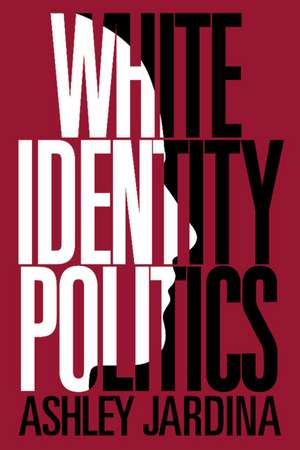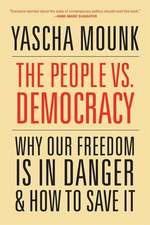White Identity Politics: Cambridge Studies in Public Opinion and Political Psychology
Autor Ashley Jardinaen Limba Engleză Paperback – 27 feb 2019
| Toate formatele și edițiile | Preț | Express |
|---|---|---|
| Paperback (1) | 166.99 lei 3-5 săpt. | |
| Cambridge University Press – 27 feb 2019 | 166.99 lei 3-5 săpt. | |
| Hardback (1) | 648.27 lei 6-8 săpt. | |
| Cambridge University Press – 27 feb 2019 | 648.27 lei 6-8 săpt. |
Din seria Cambridge Studies in Public Opinion and Political Psychology
- 14%
 Preț: 694.64 lei
Preț: 694.64 lei -
 Preț: 227.65 lei
Preț: 227.65 lei -
 Preț: 205.84 lei
Preț: 205.84 lei -
 Preț: 267.95 lei
Preț: 267.95 lei -
 Preț: 268.38 lei
Preț: 268.38 lei -
 Preț: 364.26 lei
Preț: 364.26 lei -
 Preț: 223.29 lei
Preț: 223.29 lei -
 Preț: 223.29 lei
Preț: 223.29 lei -
 Preț: 227.45 lei
Preț: 227.45 lei -
 Preț: 226.46 lei
Preț: 226.46 lei -
 Preț: 287.28 lei
Preț: 287.28 lei -
 Preț: 288.25 lei
Preț: 288.25 lei -
 Preț: 263.00 lei
Preț: 263.00 lei -
 Preț: 229.56 lei
Preț: 229.56 lei -
 Preț: 287.87 lei
Preț: 287.87 lei - 11%
 Preț: 556.32 lei
Preț: 556.32 lei -
 Preț: 286.89 lei
Preț: 286.89 lei -
 Preț: 225.20 lei
Preț: 225.20 lei -
 Preț: 280.91 lei
Preț: 280.91 lei -
 Preț: 201.59 lei
Preț: 201.59 lei - 11%
 Preț: 573.26 lei
Preț: 573.26 lei -
 Preț: 271.98 lei
Preț: 271.98 lei -
 Preț: 285.75 lei
Preț: 285.75 lei - 11%
 Preț: 554.48 lei
Preț: 554.48 lei -
 Preț: 260.11 lei
Preț: 260.11 lei -
 Preț: 322.89 lei
Preț: 322.89 lei -
 Preț: 384.34 lei
Preț: 384.34 lei -
 Preț: 224.62 lei
Preț: 224.62 lei -
 Preț: 265.11 lei
Preț: 265.11 lei
Preț: 166.99 lei
Nou
Puncte Express: 250
Preț estimativ în valută:
31.96€ • 33.24$ • 26.38£
31.96€ • 33.24$ • 26.38£
Carte disponibilă
Livrare economică 22 martie-05 aprilie
Preluare comenzi: 021 569.72.76
Specificații
ISBN-13: 9781108468602
ISBN-10: 1108468608
Pagini: 384
Ilustrații: 38 b/w illus. 21 tables
Dimensiuni: 152 x 228 x 22 mm
Greutate: 0.54 kg
Editura: Cambridge University Press
Colecția Cambridge University Press
Seria Cambridge Studies in Public Opinion and Political Psychology
Locul publicării:New York, United States
ISBN-10: 1108468608
Pagini: 384
Ilustrații: 38 b/w illus. 21 tables
Dimensiuni: 152 x 228 x 22 mm
Greutate: 0.54 kg
Editura: Cambridge University Press
Colecția Cambridge University Press
Seria Cambridge Studies in Public Opinion and Political Psychology
Locul publicării:New York, United States
Cuprins
1. The new American minority; 2. Making the invisible visible; 3. The measurement and meaning of group ties; 4. Who identifies as white?; 5. The content and contours of whiteness; 6. The preservation of whiteness; 7. Policies that protect the group; 8. A black man in the White House; 9. The future of white America.
Recenzii
'For most of the period since the civil rights movement, the best scholarship has found that whites' identities as white people played little role in their racial politics, at least as compared to their resentments of blacks. Ashley Jardina's book has changed that. It provides us with the most thorough and convincing evidence of the continuing centrality of white identity in many whites' thinking about race in America.' David O. Sears, University of California, Los Angeles
'For too long now, political scientists have tended to firewall the study of white Americans to the questions of whether out-group bias persists and, if so, whether it continues to bear the virulence of Jim Crow-style racism or manifests in new indirect, implicit strains. White Identity Politics is a breakthrough that invites us to rethink the roots of both white prejudice and white solidarity. This is an indelible and indispensable corrective that ought to be read by anyone bewildered by our current political moment.' Taeku Lee, University of California, Berkeley
'White Identity Politics provides a timely and insightful look at American racial politics from the perspective of the white majority. Jardina argues that growing demographic diversity has politicized white identity, generating a sense of white deprivation and defense of white privilege that is distinct from racial animus. Many whites do not identify strongly with their racial group but those who do show clear favoritism for policies and political candidates who promote white interests and maintain white numerical supremacy. By shifting the focus away from white prejudice and toward the defense of white privilege, the book makes an invaluable contribution to the study of American race and ethnic relations.' Leonie Huddy, Stony Brook University, New York
'The timing thus could not be better for Duke University political scientist Ashley Jardina's eye-opening book, White Identity Politics, which uses extensive survey research to explore the meaning of white identity today.' Richard D. Kahlenberg, Washington Monthly
'The volume is a smart, well-researched text that uses empirical data to undergird the author's claims … An important book.' R. A. Harper, Choice
'Excellent … an important contribution to our scholarly and societal knowledge of identity more broadly and to how we conceive of groups in contemporary society.' Samara Klar, The Journal of Politics
'Let me cut right to the chase. Every scholar of public opinion, racial and ethnic politics, and political psychology in the United States should read and own this book. It will be pulled off the shelf and cited often. It will inspire.' Deborah J. Schildkraut, Public Opinion Quarterly
'Jardina situates White solidarity as a construct that requires greater scrutiny and … [shows] White identity is not merely conservatism, working class ideology, nationalism, or racial prejudice. Instead it operates as a coherent and meaningful core attachment among members of the dominant racial group … A must read for all who endeavor to understand contemporary politics, public opinion, or social stratification in the United States.' David C. Wilson, Journal of Race, Ethnicity, and Politics
'Jardina's research is carefully executed and there is no doubt that she has painstakingly attempted to proactively respond to potential criticisms … a must read for all who endeavor to understand contemporary politics, public opinion, or social stratification in the United States.' David C. Wilson, Journal of Race, Ethnicity, and Politics
'The implications of Jardina's theory toward our understanding of racial conflict, including racist actions, are subtle yet important.' James. M. Thomas, American Journal of Sociology
'Jardina examines the increasing relevance of white identity in America … Jardina finds that about thirty to forty per cent of white Americans say that white identity is important to them.' Isaac Chotiner, The New Yorker
'Jardina's research finds that it isn't just pundits and political scientists who have zeroed in on whiteness as an affirmative political identity: Many white Americans are identifying themselves with their racial group as well … Despite common oversimplifications about who these voters are, Jardina finds little evidence to suggest they are largely members of an economically fragile working class.' David A. Graham, The Atlantic
'For too long now, political scientists have tended to firewall the study of white Americans to the questions of whether out-group bias persists and, if so, whether it continues to bear the virulence of Jim Crow-style racism or manifests in new indirect, implicit strains. White Identity Politics is a breakthrough that invites us to rethink the roots of both white prejudice and white solidarity. This is an indelible and indispensable corrective that ought to be read by anyone bewildered by our current political moment.' Taeku Lee, University of California, Berkeley
'White Identity Politics provides a timely and insightful look at American racial politics from the perspective of the white majority. Jardina argues that growing demographic diversity has politicized white identity, generating a sense of white deprivation and defense of white privilege that is distinct from racial animus. Many whites do not identify strongly with their racial group but those who do show clear favoritism for policies and political candidates who promote white interests and maintain white numerical supremacy. By shifting the focus away from white prejudice and toward the defense of white privilege, the book makes an invaluable contribution to the study of American race and ethnic relations.' Leonie Huddy, Stony Brook University, New York
'The timing thus could not be better for Duke University political scientist Ashley Jardina's eye-opening book, White Identity Politics, which uses extensive survey research to explore the meaning of white identity today.' Richard D. Kahlenberg, Washington Monthly
'The volume is a smart, well-researched text that uses empirical data to undergird the author's claims … An important book.' R. A. Harper, Choice
'Excellent … an important contribution to our scholarly and societal knowledge of identity more broadly and to how we conceive of groups in contemporary society.' Samara Klar, The Journal of Politics
'Let me cut right to the chase. Every scholar of public opinion, racial and ethnic politics, and political psychology in the United States should read and own this book. It will be pulled off the shelf and cited often. It will inspire.' Deborah J. Schildkraut, Public Opinion Quarterly
'Jardina situates White solidarity as a construct that requires greater scrutiny and … [shows] White identity is not merely conservatism, working class ideology, nationalism, or racial prejudice. Instead it operates as a coherent and meaningful core attachment among members of the dominant racial group … A must read for all who endeavor to understand contemporary politics, public opinion, or social stratification in the United States.' David C. Wilson, Journal of Race, Ethnicity, and Politics
'Jardina's research is carefully executed and there is no doubt that she has painstakingly attempted to proactively respond to potential criticisms … a must read for all who endeavor to understand contemporary politics, public opinion, or social stratification in the United States.' David C. Wilson, Journal of Race, Ethnicity, and Politics
'The implications of Jardina's theory toward our understanding of racial conflict, including racist actions, are subtle yet important.' James. M. Thomas, American Journal of Sociology
'Jardina examines the increasing relevance of white identity in America … Jardina finds that about thirty to forty per cent of white Americans say that white identity is important to them.' Isaac Chotiner, The New Yorker
'Jardina's research finds that it isn't just pundits and political scientists who have zeroed in on whiteness as an affirmative political identity: Many white Americans are identifying themselves with their racial group as well … Despite common oversimplifications about who these voters are, Jardina finds little evidence to suggest they are largely members of an economically fragile working class.' David A. Graham, The Atlantic
Notă biografică
Descriere
Amidst discontent over diversity, racial identity is a lens through which many US white Americans now view the political world.

